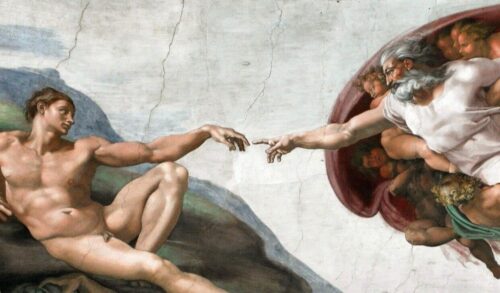
You Are Wanted … by the Creator of the Universe!
Will All People Be Saved?
I recall so well a comment made by a so-called “evangelist” in the Worldwide Church of God during a Sabbath message at Big Sandy, Texas. As a student at Ambassador College, I had decided that I was a square peg in a round hole and did not fit the template of a “yellow pencil,” parroting whatever the leadership wanted me to do without considering personal proclivities and questions.
This particular preacher shouted from the podium, “You can be replaced!” He was angry, and I knew that anger was in particular directed at me for daring to decide on my own, as a faculty member, to desert their august, infallible organization. I had had enough, and needed to leave the suffocating political structure of the college and struggle the surface for air … for the freedom and liberty the Creator designed for all of mankind by virtue of their existence.
I do not recall the justification this speaker gave for his claim that any of us could be replaced from within the body of Christ, but since that time I have come to understand just how wrong he was in his claim. Let us explore what the Scriptures say regarding our calling, and whether there is any justification for claiming that any of us can be thrown away and replaced from God’s great kingdom and plan of salvation.
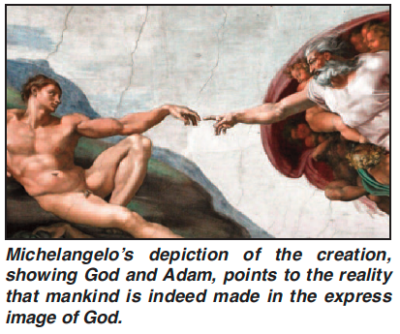
Our Creator Wants No One to be Lost
Let us be clear: the Eternal Living God created mankind in His express image, as stated plainly in Genesis 1:26-27, where He said,
“Then God said, ‘Let us make man in Our image, according to our likeness’ …. So God created man in His own image: in the image of god He created him; male and female He created them.”
The Eternal also instructed that these first parents should “Be fruitful and multiply, fill the earth and subdue it …” (Genesis 1:28), an instruction repeated to Noah after the Great Flood (Genesis 9:1). Were these many sons and daughters made in the image of God to populate the earth for no good reason? God never does anything without a great purpose in mind!
The Hebrew word for image is tselem, meaning “a phantom or replica” (see I Samuel 6:5), and we see in I John 3:2, Romans 8:29, I Corinthians 15:49, Philippians 3:21, and II Peter 1:4 that we will look just like Christ in the resurrection. Putting this truth together with John 14:9, which states, “He who has seen Me has seen the Father,” we conclude that our appearance will be like that of Jesus in His glorified form, and also in the image of the Father Himself.
Seeing our identity with Christ and the Father, we also can understand that our destiny is to be kings and priests (Revelation 1:6; 5:10; 20:6; Exodus 19:6; I Peter 2:5, 9), and to reign on the earth with Christ for 1,000 years (Revelation 5:10; 20:4). We will be eternal spirit, sons of Elohim, brothers of Jesus Christ who will bring the order and restitution to this earth, to make it a literal Garden of Eden planet-wide (Romans 8:9-23). Our purpose will be to complete the job of rebuilding a literal utopia on the earth, picking up where Adam and Eve left off, and ultimately shepherd all people of all nations to acknowledge and follow in the footsteps of Jesus Christ to bring such an illustrious world to reality.
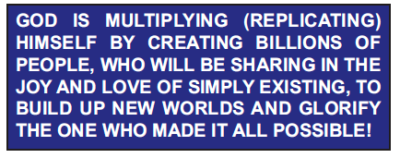
None to Be Lost?
With this backdrop to the purpose for mankind being created in the first place, would it not make sense that the Creator would do everything He can — pull out all the stops — to bring His creations to eternal sonship with Him? That is a very logical conclusion, but with a major caveat: God will not force any of His creations to obey Him, but requires them to choose of their own free will to follow Him or not. Notice His command to Israel in Deuteronomy 30:19-20).
“I call heaven and earth as witnesses today against you, that I have set before you life and death, blessing and cursing; therefore choose life, that both you and your descendants may live; that you may love the Lord your God, that you may obey His voice, and that you may cling to Him, for He is your life and the length of your days; and that you may dwell in the land which the Lord swore to your fathers, to Abraham, Isaac, and Jacob, to give them.”
Paul speaks powerfully to Timothy concerning not just the salvation of the elect, but of all people regardless of their lineage or current persuasions.
“Therefore I exhort first of all that supplications, prayers, intercessions, and giving of thanks be made for all men, for kings and all who are in authority, that we may lead a quiet and peaceable life in all godliness and reverence. For this is good and acceptable in the sight of God our Savior, who desires all men to be saved and to come to the knowledge of the truth” (I Timothy 2:1-4).
Peter reiterates this desire of the Creator.
“The Lord is not slack concerning His promise, as some count slackness, but is longsuffering toward us, not willing that any should perish but that all should come to repentance” (II Peter 3:9).
Moreover, Paul makes clear that the entire nation of Israel wil be saved, with whom Yahweh made His covenant at Mount Sinai, the covenant that stated,
“‘Now therefore,if you will indeed obey My voice and keep My covenant, then you shall be a special treasure to Me above all people; for all the earth is Mine. And you shall be to Me a kingdom of priests and a holy nation.’ These are the words which you shall speak to the children of Israel” (Exodus 19:5-6).
The blindness of the descendants of Israel will in their entirety be removed, just a Paul stated in Romans 11:25, once the “fulness of Gentiles has come in.” Then Paul states in verses 26 and 27,
“And so all Israel will be saved [or delivered], as it is written, ‘The Deliverer will come out of Zion, and He will turn away ungodliness from Jacob; for this is My covenant with them, when I take away their sins.’”
Yahweh Elohim takes no pleasure in the death of the wicked, but pleads with them to turn from their wicked ways and live (Ezekiel 18:23,32; II Chronicles 7:14). Does this mean that every one of those made in His image will inherit salvation?
Matthew 18:12-14 states that if a man has 100 sheep, and one of them goes astray, he will naturally leave the 99 and “go to the mountain to seek the one that is straying.” If that straying lamb is found, the owner rejoices more over the sheep that is found more than over the 99 that did not stray. The rendition in Luke 15:4-7 is only slightly different, stating that “there will be more joy in heaven over one sinner who repents than over 99 just persons who need no repentance” (verse 7).
Universalism
It should come as no surprise that books have been written on the subject of whether all people will be saved, or just a portion of mankind. A brief review of two books that cover the matter of universalism is given below, a belief that is deemed important enough that adherents at times have been persecuted to the death by the religious powers that be.
The Ancient History of Universalism, from the Time of the Apostles to Its Condemnation in the Fifth General Council, A. D. 553, by Hosea Ballou, II, pastor of the Universalist Church and Society of Roxbury, Massachusetts, published by Marsh and Capen, Boston, Massachusetts, in 1829. Chapters included the following.
Chapter 1. Opinions obtained by the Christians, from A.D. 90 to A.D. 150, concerning future punishment and the eventual salvation of the world, exhibited by means of all the relative passages in the Orthodox writings extant of this period, and by a summary statement of the doctrine of the early Gnostic sects.
Chapter 2. Opinions of the Christians from A.D. 150 to A.D. 190, concerning future punishment, and the eventual salvation of the world, illustrated by extracts from all the authors extant of this period, who have introduced the subject.
Chapter 3. Clemens Alexandrinus, and his contemporaries; or the opinions of the Christians from A.D. 190 to A.D. 230, concerning the future state.
Chapter 4. Origen and his doctrine [of universalism].
Chapter 5. Origen’s scholars and contemporaries; or opinions of Christians from A.D. 230 to A.D. 270, concerning universalism.
Chapter 6. History of Origen’s doctrine from A.D. 254 to A.D. 390, and the opinions entertained by the Christians, in the meantime, concerning the future state.
Chapter 7. The contest with the Origenists, from A.D. 391 to A.D. 404, in which universalism is for the first time censured, and in part condemned.
Chapter 8. History of universalism from A.D. 405 to A.D. 500.
Chapter 9. Revival and progress of Origenism in Palestine, and final condemnation of universalism in the Fifth General Council.
Appendix: Traces of the doctrine from the time of the Fifth General Council to the era of the Reformation; A.D. 649 to A.D. 1498.
The Modern History of Universalism, from the Era of the Reformation to the Present Time A.D. 1830, by Thomas Wittemore, pastor of the First Universalist Society in Cambridge, Massachusetts, published by the author at Cornhill, Massachusetts, in 1830.
Chapter 1. The Reformation, and the rise, condemnation, and dispersion of the Anabaptists.
Chapter 2. The Reformation in England, spread of the principles of the Anabaptists and other sects, and their condemnation.
Chapter 3. History of universalism in England, its reappearance, its condemnation by the Parliament, and notices of its defenders.
Chapter 4. History of universalism in England continued, and notices of its eminent defenders.
Chapter 5. Universalism in various countries: Germany, Holland, Switzerland, France, Prussia, Italy, Ireland, and Scotland.
Chapter 6. History of universalism in England continued.
Chapter 7. History of universalists in England as a distinct denomination.
Chapter 8. History of universalism in the United States of America.
Chapter 9. From the conversion of Mr. Winchester to the formation of the general convention.
Chapter 10. History of the general convention, and notices of some publications of universalian controversy.
Chapter 11. Sketches of the rise of universalism in the several states, with its present condition and prospects; changes of opinion among universalists, and the views they now entertain: Maine, New Hampshire, Vermont, Rhode Island, Connecticut, New York, New Jersey, Pennsylvania, Delaware, Maryland, Virginia, North Carolina, South Carolina, Georgia, Alabama, Louisiana, and western states.
I have given the general contents of these two books on universalism to illustrate the widely-held belief in this doctrine over many centuries … that all people will ultimately receive salvation from the Father. This idea seriously conflicted with Roman Catholic doctrine, which stated that unless one became a Catholic there was no hope of salvation. Also, most Roman and Protestant groups taught, and still teach to the present day, that there exists an ever-burning hell into which unbelievers are cast, to be tortured day and night forever and ever.

What Does God Say?
Can we prove or disprove universal salvation? Let us look at the evidence in Scripture.
1. One major argument against universal salvation is Jesus’ response to the Pharisees when they had accused him of casting out demons by the power of Beelzebub, ruler of the demons (Matthew 12:24). Three of the gospels speak of this incident.
“Therefore I say to you, every sin and blasphemy will be forgiven men, but the blasphemy against the spirit will not be forgiven men” (Matthew 12:31-32).
“Assuredly, I say to you, all sins will be forgiven the sons of men, and whatever blasphemies they may utter; but he who blasphemes against the holy spirit never has forgiveness, but is subject to eternal condemnation” (Mark 3:28-29).
“And anyone who speaks a word against the Son of Man, it will be forgiven him, but to him who blasphemes against the holy spirit, it will not be forgiven” (Luke 12:10).
blaspheme = blasphemeo, to use speech to bring down another person’s value, honor, or due-respect, or to injure another person’s reputation in the eyes of others.” According to Kohlenberger (The New Strong’s Expanded Exhaustive Concordance of the Bible, Thomas Nelson, Nashville, Tennessee, 2001), “As to Christ’s teaching concerning ‘blasphemy’ against the holy spirit, e. g. Matthew 12:32, that anyone, with the evidence of the Lord’s power before His eyes, should declare it to be Satanic, exhibited a condition of heart beyond divine illumination and therefore hopeless. Divine forgiveness would be inconsistent with the moral nature of God.”
This case of blasphemy appears to be unique in that the Pharisees condemned the Son of God of being demon-possessed. This accusation was without excuse, since they knew that Jesus was the Messiah, and that prophecies about Him were being fulfilled. They saw His wonderful works and heard his preaching of the truth, but deliberately chose to deny this truth and slander the power by which He spoke, healed, and cast out demons. Standing before the very presence of the Savior of the world, they defiantly closed their eyes and became willfully blind to Him and His power. This sin was unpardonable.
It is doubtful that such blasphemy could occur today since Jesus is now ascended to the Father, and no one could personally see Jesus perform a miracle — such as casting out a demon — and attribute that power to Satan rather than the Father. It is possible, however, that one of God’s elect today might cast out a demon, and that act be attributed to the forces of evil, for we walk in the footsteps of Jesus, and in fact He said, “… he who believes in Me, the works that I do he will do also; and greater works than these he will do, because I go to My Father” (John 14:12).
We see that, “… if we sin willfully after we have received the knowledge of the truth, there no longer remains a sacrifice for sins, but a certain fearful expectation of judgment, and fiery indignation which will devour the adversaries” (Hebrews 10:26-27). Also, I John 5:16 states there is a sin leading to death, for which we should not pray about, and II Peter 2:20-22 says,
“For if, after they have escaped the pollutions of the world through the knowledge of the Lord and Savior Jesus Christ, they are again entangled in them and overcome, the latter end is worse for them than the beginning. For it would have been better for them not to have known the way of righteousness, than having known it, to turn from the holy commandment delivered to them. But it has happened to them according to the true proverb, ‘A dog returns to his own vomit,’ and ‘a sow, having washed, to her wallowing in the mire.’”
Moreover, the night before His crucifixion Jesus spoke of Judas as “… it would have been good for that man if he had not been born” (Matthew 26:24).
Putting these Scriptures together, the following appear clear: (1) the hard-hearted Pharisees, whose jealousy of the Messiah and His massive following drove them to livid hatred and murder, apparently consigned them to never being forgiven; (2) of Judas, the betrayer of Jesus, He said it would have been better that he had never been born; and (3) anyone who rejects the truth after coming to know and understand that truth that leads to salvation is consigned to death! These understandings appear to annihilate universalism. However, I John 1:9 shows us that, “If we confess our sins, He is faithful and just to forgive our sins and to cleanse us from all unrighteousness.”
Is our heavenly Father able to forgive anyone of any sin he or she may have committed, no matter how egregious it may have been? Of course He is! Even Judas, about whom Jesus said it would have been better that he had never been born, repented of his having betrayed Jesus when he returned the 30 pieces of silver to the chief priests and elders (Matthew 27:3-5). Yet, some in their foolish pride and hardened hearts may not be willing to repent. Satan the devil and the demons are prime examples; they will be discussed in a bit.
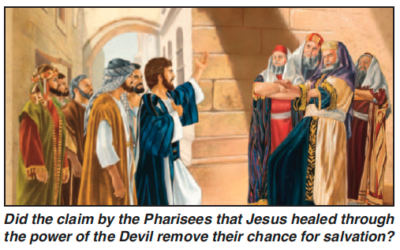
2. For universal salvation to be true, everyone must at some time be called by the Father, and everyone must accept that calling. We have the very straightforward message of John 6:44,
“No one can come to Me unless the Father who sent Me draws him; and I will raise him up at the last day.”
draw = helkuo, “to drag, literally or figuratively.”
This statement appears to indicate that some people indeed might not be called by the Father, but this does not need to be the case. Also, there is no indication of when this calling by the Father will come, whether for the first resurrection or the second one. The firstfruits are being drawn by the Father in this age, but after the millennium there will be another resurrection (Revelation 20:5). This second resurrection will be one to physical life, as we understand it, of all of those who were not called for the first resurrection. These people will be required to believe, repent, and receive God’s spirit as do each of us in this age. Thereafter will be the great White Throne Judgment (Revelation 20:11-15), in which those whose names are written in the Book of Life will be given their place in the New Jerusalem, just as those in the first resurrection were given theirs. “In My Father’s house are many mansions [mone, ‘abode or residence’]” (John 14:2). That residence involves particular responsibilities in the Father’s kingdom, which are indicated in Revelation 20:12 and 13, and further identified in Revelation 22:12 They will be rewarded as to what their work shall be in the coming age.
There is no guarantee that all of those who are called — which will undoubtedly include all of His creations made in His image throughout history — will accept that calling. Indeed, we see in Revelation 20:15 that, “And anyone not found written in the Book of Life was cast into the lake of fire.” Why would this statement even be made if there would not be some poor individuals who would refuse to pursue the calling of their heavenly Father?
Therefore, there appear to be indications that not everyone, for some reason or other, will accept the Father’s calling to come to Jesus Christ. Universal salvation cannot be assured by this point.
3. For universal salvation to be true, there can be no Scriptural references to anyone being eternally destroyed. We do have evidence of the eternal destruction of Satan, and presumedly the demons with him. Notice that Revelation 20:7-10 reveals that Satan, after his 1,000-year imprisonment in the abyss, is released and attempts to overcome the saints and Jerusalem. Then,
“The devil, who deceived them, was cast into the lake of fire and brimstone where the beast and the false prophet [were cast]. And they will be tormented day and night forever and ever” (Revelation 20:10).
I believe that Satan, having been imprisoned in the bottomless pit for 1,000 years, will be given the choice of repenting, or facing another imprisonment in the abyss for an interminable period of time … and seeing that his options are extremely limited, and unwilling to endure a future of captivity and utter isolation as experienced the previous 1,000 years, he will rather elect to be terminated forever. This is the torment. He will manifest himself as material flesh and blood, and in that state will be able to be consumed by fire and forever cease to exist. This is alluded to in Ezekiel 28:18-19.
“You defiled your sanctuaries by the multitude of your iniquities, by the iniquity of your trading; therefore I brought fire from your midst; it devoured you, and I turned you to ashes upon the earth in the sight of all who saw you. All who knew you among the people are astonished at you; you have become a horror, and shall be no more forever.”
Satan will willingly have himself destroyed to avoid an unbearable future. Materializing as flesh, his body will be consumed by fire, which is likely an internal combustion as described by Larry Arnold in his book Spontaneous Human Combustion, M. Evans and Company, New York, 1995. People even today are occasionally consumed by a spontaneous decomposition of their bodies, leaving ashes in their wake. To leave ashes, Stan would have to be material, and once burned he will “… be no more forever” (Ezekiel 28:19).
Presumably the demons will meet the same fate as Satan, as will the wicked.
“‘For behold, the day is coming, burning like an oven, and all the proud, yes, all who do wickedly will be stubble. And the day which is coming shall burn them up,’ says the Lord of hosts …. ‘You shall trample the wicked, for they shall be ashes under the soles of your feet on the day that I do this,’ says the Lord of hosts” (Malachi 4:1, 3).
The Nephilim also will be destroyed, or should we say already deceased as described in Isaiah 26:4; the word deceased in verse 14 is actually nephilim as is the word the dead in verse 19. They will have no resurrection. Being partially sons of Elohim and partially human (Genesis 6:2-4), they are definitely not predestined for salvation, though they have lived as wicked abnormal giants among mankind. Thus, we know that some spirit individuals will not live forever, and that may well include some non-hybridized humans as well.
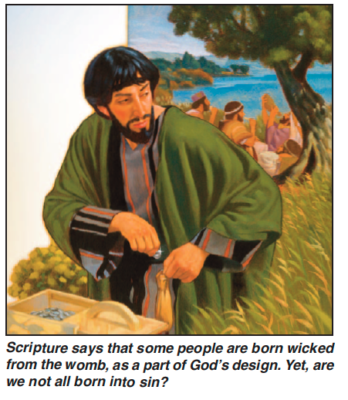
4. For universal salvation to be true, then the individuals who are termed “wicked’ in Scripture will somehow have to be changed. Especially notable in this regard is a section of Romans written by Paul.
“But indeed, O man, who are you to reply against God? Will the thing formed say to him who formed it, ‘Why have you made me like this?’ Does not the potter have power over the clay, from the same lump to make one vessel for honor and another for dishonor? What if God, wanting to show His wrath and to make His power known, endured with much longsuffering the vessels of wrath prepared for destruction, and that He might make known the riches of His glory on the vessels of mercy, which He had prepared beforehand for glory, even us whom He called, not of the Jews only but also of the gentiles?” (Romans 9:20-24).
destruction = apoleia, “ruin or loss”; from apollumi, “to destroy fully.”
This idea of the wicked being prepared for destruction, in contrast to the righteous being prepared to receive mercy and salvation by the same Creator, hearkens back to the fact that the righteous have been chosen in Him before the foundation of the world, predestined to be sons of God (Ephesians 1:4). Might the wicked likewise, then, be predestined from before the foundation of the world to be destroyed?
Such an idea appears to fly in the face of the Creator’s desire that all of His creations should be saved. Yet, we have affirmation by David in Psalm 58:3-5 that even from conception some people are made evil.
“The wicked are estranged from the womb; they go astray as soon as they are born, speaking lies. Their poison is like the poison of a serpent; they are like the deaf cobra that stops its ears, which will not hear the voice of charmers, charming ever so skillfully.”
wicked = rasha, “a bad person.”
estranged = zuwr, “turn aside.”
astray = taah, “vacillate, reel, or stray.”
These people born evil people sound just like the people Paul is describing in Romans 9. They are made that way, to be evil from conception. How can that be? Are these the seed of Satan himself, descendants of the Nephelium who will not even be resurrected? Paul and David do not say, but it is likely that David is speaking of being conceived with a sinful nature — “Behold, I was brought forth in iniquity, and in sin my mother conceived me” (Psalm 51:5), even as Isaiah called the nation of Israel “a transgressor from the womb” (Isaiah 48:6), and Jeremiah acknowledged that “The heart is deceitful above all things, and desperately wicked; who can know it?” (Jeremiah 17:9).
It appears that Paul in Romans 9, when he speaks of people being “vessels of wrath prepared for destruction,” is referring to those individuals who are not firstfruits of this age, but, like all people, were born with a sinful nature but did not, and will not, repent of their carnality … but rather they enlarge upon this sensuous, fleshly lusts, lusts outlined in Galatians 5:19-21 and II Timothy 1:4. While Paul in Romans 9 makes it sound like these people were predestined to be monsters of evil from conception, he may have been figuratively assigning them to destruction in their unrepentant state. Even a wicked person may feel justified in his sins, but in time — each in his order (I Corinthians 15:23) — even these wicked ones will be given a calling, likely in the second resurrection. Remember that Paul himself understood his own wretchedness and unworthiness to be called (I Corinthians 15:9; Ephesians 3:8).
Seeing that the wicked are estranged from the womb, and in reality all of us are born with a sinful nature, it is imperative that all people repent of their sins for universal salvation to be true. This may be stretching reality.
5. For universal salvation to be true, the narrow and difficult pathway that leads to life cannot exclude, ultimately, those on the broad pathway that leads to destruction. Note the story in Matthew 7:13-14.
“Enter by the narrow gate; for wide is the gate and broad is the way that leads to destruction, and there are many who go in by it. Because narrow is the gate and difficult is the way which leads to life, and there are few who find it.”
Does this Scripture imply that most people will follow the pathway that leads to eternal death, without hope of life beyond the grave? No, not at all. The Greek word for destruction is apoleia, meaning “the loss of well-being.” Thus, following the way of life that the broad majority follow in this world is a formula for trouble and sorrow, and which exercises the carnal nature as described in Galatians 5:17-21. It is the life that is termed “unrighteous” in I Corinthians 6:9, that will not lead to eternal life. Lives lived with sexual uncleanness, idolatry, adultery, thievery, covetousness, extortion, and drunkenness cannot expect to receive the reward of the first resurrection. The narrow gate [histemi, “to make to stand”] is difficult [thlibo, to suffer affliction, to be troubled”], referring to suffering due to the pressure of circumstances or the antagonism of people. The word is translated in the KJV afflict (II Corinthians 1:6; I Timothy 5:10; Hebrews 11:37), suffer tribulation (I Thessalonians 3:4), and trouble (II Corinthians 4:8; 7:5; II Thessalonians 1:6-7). Thlibo refers almost invariably to circumstances that come upon a person from without.
We certainly cannot say that these people who enter life through the wide gate are lost to eternal damnation. They simply have not been called to be firstfruits in this age, but certainly will be called in the second resurrection, “… But each one in his own order…” (I Corinthians 15:23).
Matthew 7:13-14 does not confirm or deny universal salvation, but is a warning to us who have been called to be firstfruits to not abandon the pathway that leads to eternal life to which we have been called. The narrow and difficult pathway that leads to life is full of pressure from society around us to conform to the pulls of the flesh. That is the carnal example given by so many well-known people we are exposed to in sports, entertainment, government, religion, business, and education.

Universal Salvation: Is It Correct?
I personally wish that every created human being in God’s image would inherit eternal life. That is the Eternal’s wish as well. Yet, no one who has not repented of his sins, claimed faith in Jesus Christ and the Father, been baptized and received the spirit of God, and striven to live a life dedicated to his Maker (Hebrews 6:1-2) will be able to be resurrected to eternal life. The choice to choose life is a personal one between the Father and those He calls. He does not force anyone to follow Him, but for anyone who values life the choice is clear. Follow Christ so you may achieve eternal sonship with the Father and fulfill your purpose for being created.
Is it possible that the choice has already been made, because those whom He calls were ordained to be called before the foundation of the world (Ephesians 1:4-6)? The answer is not immediately obvious, and likely will never be made clear until the Father reveals the answer. Besides, it is impossible to know for certain whether or not you are playing a part in a scheme already known. Do we have free will not? Predestination is a powerful word, and it is used in both Ephesians 1 and Romans 8 to describe the destiny of the elect. The Greek word for predestined is proorizo, meaning “to mark out beforehand, to determine before, to foreordain.”
Does “… He chose us in Him before the foundation of the world, that we should be holy and without blame before Him in love …” (Ephesians 1:4) refer to each individual who is called and chosen by the Father, or to a group of individuals that would be chosen in the end time to be saints? I prefer the former interpretation. Time will bear out if I am right or not.
I believe there will be some few individuals who will refuse for whatever reason to repent of their sins and accept the blood of Jesus Christ in payment for their sins. We have seen how Satan and the demons, and the Nephalism who are part human and part evil sons of Elohim, will be utterly burned up … destroyed forever. We must add in the Beast and the False Prophet, who had also been cast into the lake of fire (Revelation 19:20; 20:10). This proves that it is possible for people to become so incorrigibly corrupted that there is no hope of their repenting. I personally cannot fathom such a state, given the purpose for which we as God’s children were created, and the incredible rewards for living His ways. Yet, some few will likely not have their names written in the Book of life. Why else would God have mentioned this possibility in Revelation 20:15?
Universal salvation for all of mankind throughout all of history? I would say mostly, but not totally. It is not a matter of salvation for us to know the answer to this matter, but what is vitally important is that we personally do not fail to stay the course, and complete the calling that the Father has given us to be His sons, raised incorruptible at the return of Jesus Christ at the first resurrection, and be with Him forever. We must endure to the very end of this age, and let no one take our crown. Let universal salvation apply to each of us individually!

